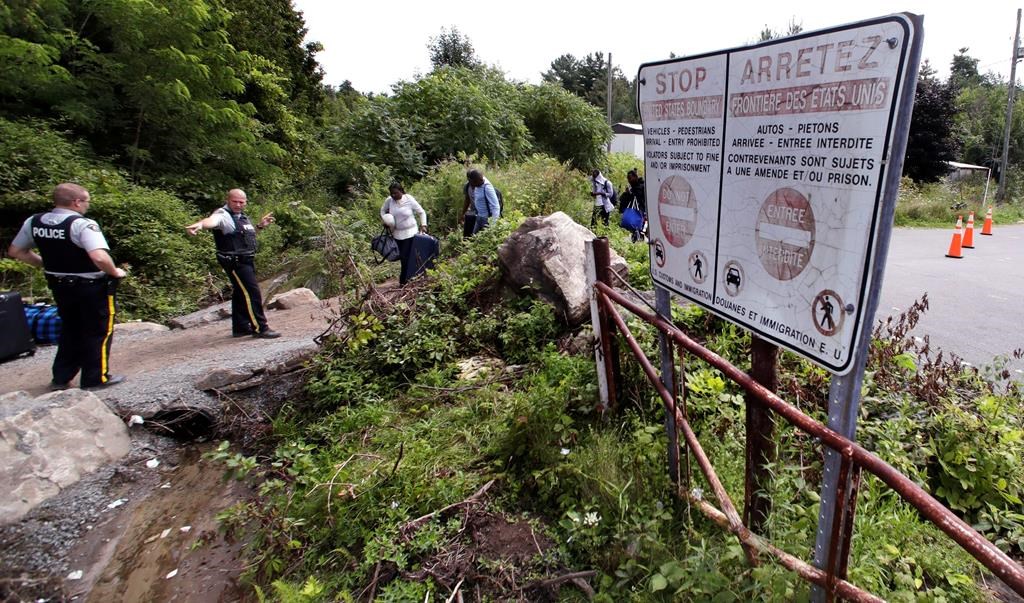The Federal Court of Appeal has granted a request made by the federal government to temporarily suspend a lower court’s decision that would have scrapped the Safe Third Country Agreement between Canada and the United States at the end of January.

The agreement, which allows each country to turn away asylum seekers who try to make refugee claims at official border crossings, was ruled unconstitutional by the Federal Court in July.
By accepting the government’s application, the court is maintaining the status quo at the border, meaning asylum seekers will still be sent back to the U.S.
“The motion is granted. The judgment of the Federal Court is stayed until final determination of the appeal,” wrote Federal Court of Appeal Justice David Stratas.
Stratas’ ruling doesn’t do away with the Federal Court’s original decision that said the border deal is unconstitutional. It does, however, allow the government to wait for the outcome of its appeal before deciding what to do at the border.
If the government wins its appeal, which will likely be heard late February or early March, the border deal will almost certainly remain intact. If the government loses its appeal, the agreement will likely be scrapped for good, unless the government decides to appeal the loss to the Supreme Court.

In her original decision issued on July 22, Federal Court Justice Ann McDonald said the Safe Third Country Agreement was unconstitutional because it deprives asylum seekers of their fundamental rights of liberty and security of the person.
McDonald also said Canadian immigration and border officials are complicit in the mistreatment of asylum seekers sent back to the U.S. under the deal. This includes indefinite and arbitrary detention, plus prolonged use of solitary confinement.
“It is my conclusion, based upon the evidence, that ineligible (refugee) claimants are returned to the U.S. by Canadian officials where they are immediately and automatically imprisoned,” McDonald wrote.
McDonald gave the government until the end of January to prepare for the agreement to end because she recognized it was in the public interest not to strike down the deal immediately.
Stopping a ‘surge’ of refugees
The government has appealed McDonald’s decision, arguing there would be “irreparable harm” to the rule of law and to the public good if the border agreement is overturned.
The government said scrapping the agreement will result in an “influx” of asylum seekers at the border, making it more difficult for different levels of government to maintain the existing refugee system, including providing housing and other social services.

Lawyers for the government also said the anticipated surge in new asylum seekers would slow down the claims process for those already awaiting a decision.
At present, there are roughly 90,000 refugee claimants in Canada either waiting for a hearing or waiting for their case to be decided. The average wait time before a hearing is roughly two years, according to the government.
Scrapping the deal before an appeal is heard could also force the government to relocate border officers and make other practical changes at the border that may end up being reversed depending on the outcome of the appeal, the government argued.
Government case is ‘a fantasy’
The original Federal Court challenge of the Safe Third Country Agreement was filed in 2017 and hearings were held near the end of 2019. Lawyers for the Canadian Council for Refugees, the Canadian Council of Churches and Amnesty International joined the case and acted on behalf of a group of asylum seekers.
In the most recent hearing before Justice Stratas, lawyers for this group argued the government’s claim that there will be a “surge” in new asylum seekers at the border if the agreement is undone is “speculative” and “hypothetical.”

This is even more true in the era of the novel coronavirus pandemic, the lawyers argued, because the number of people seeking asylum in Canada has dropped “precipitously” since international travel restrictions and border measures were imposed.
“The idea that the pandemic will have been eliminated and borders reopened three months from now is certainly appealing. (But) It’s clearly a fantasy,” said immigration and refugee lawyer Andrew Brouwer.
Data from the Immigration and Refugee Board of Canada shows the number of asylum seekers entering Canada dropped from more than 7,600 people between April and August 2019, to fewer than 130 people during the same time period in 2020.
Claims spiked despite border deal
There has been a large jump in the number of asylum seekers entering Canada since 2017. Many of these people crossed the border between official ports of entry, most notably at Roxham Road near Lacolle, Que.
But the jump in refugee claims occurred while the Safe Third Country Agreement was in place. Because the deal allows the government to turn away asylum seekers who try to enter the country at official ports of entry, would-be refugees who do not meet specific exemptions under the agreement, such as having a family member who lives in Canada, must find other ways to cross the border if they want to make a refugee claim in Canada.

Anyone who crosses the border between official ports of entry is detained by the RCMP and undergoes security screening and a preliminary health check. Crossing the border this way for the purpose of making an asylum claim can’t result in charges being laid. The Immigration and Refugee Protection Act explicitly says so.
Those flagged for a serious criminal past are barred from seeking refugee protection, regardless of how they enter the country.
Since March 2017, roughly 59,000 people have crossed the border between official ports of entry for the purpose of making an asylum claim, according to data from the Immigration and Refugee Board of Canada.. About 15,000 of these claims have been approved, 12,000 have been rejected, and 29,000 are awaiting a decision.
The government has repeatedly said it is negotiating with the U.S. to “modernize” the Safe Third Country Agreement, but has never explained what this means and whether any possible changes to the deal would block people from making asylum claims after crossing the the border between official ports of entry.
- As Canada’s tax deadline nears, what happens if you don’t file your return?
- Posters promoting ‘Steal From Loblaws Day’ are circulating. How did we get here?
- Drumheller hoping to break record for ‘largest gathering of people dressed as dinosaurs’
- Planning a summer trip to Quebec’s Îles-de-la-Madeleine? You’ll have to pay up




Comments